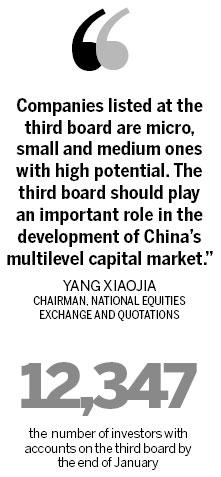Third national exchange proves popular
By Cai Xiao (China Daily) Updated: 2014-02-21 07:18"Companies listed at the third board are micro, small and medium ones with high potential," said Yang.

Of the 642 companies, about 59 percent have annual sales less than 50 million yuan. More than 80 percent are high-tech companies.
By the end of January this year, 12,347 investors had opened accounts with the third board, increasing 28.2 percent over that at the end of 2013.
The minimum funding amount for an individual investor with the board is 5 million yuan.
"The third board should play an important role in the development of China's multilevel capital market," said Yang.
Companies listed on the third board can apply for initial public offerings on the Shanghai and Shenzhen stock exchanges. Companies transferring shares on regional equity exchanges can apply for third-board listings.
One company on the third board, Beijing ECHO Technologies Co Ltd, was listed on the ChiNext market in Shenzhen Stock exchange this year.
Yang said they will pay attention to strengthening the market's system construction, perfecting the market supervision system, classifying listed companies and carrying out more innovative financing tools.
The third board is also the only over-the-counter market regulated by the China Securities Regulatory Commission.
Chen Yuemeng, chairman of ZSVC, a Hangzhou-based Chinese leading venture capital firm, said he is positively seeking opportunities with the third board because companies listed there have great potential and standard financial conditions.
Yi Jigang, president of the Beijing-based private-equity firm Orient Jiyi Investment, said the National Equities Exchange and Quotations statement is very positive for the Chinese capital market.
"The third board can help companies and investors find good cooperative partners and negotiate deals by themselves, which is very market-oriented," Yi said.
Don't miss:
|
 |
 |
| China's top 10 richest cities |
- NHTSA says finds no 'defect trend' in Tesla Model S sedans
- WTO rare earth ruling is unfair
- Amway says 2014 China sales may grow 8%
- President Xi in Europe: Forging deals, boosting business
- CNOOC releases 2013 sustainability report
- Local production by Chery Jaguar Land Rover this year
- Car lovers test their need for speed in BMW Mission 3
- China stocks close mixed Monday

















